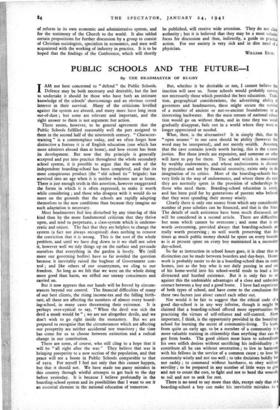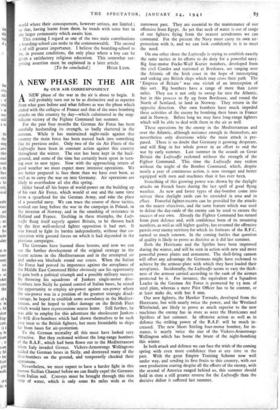PUBLIC SCHOOLS AND THE FUTURE -I
By THE HEADMASTER OF RUGBY
T AM not here concerned to " defend " the Public Schools. 1. Defence may be both necessary and desirable, but the last to undertake it should be those who have both an intimate knowledge of the schools' shortcomings and an obvious vested Interest in their survival. Many of the criticisms levelled against the system are absurd, and many more have long neen out-of-date ; but some are relevant and important, and the right answer to them is not argument but action.
There seems, however, to be general agreement that the Public Schools fulfilled reasonably well the part assigned to them in the second half of the nineteenth century. " Character- training " is a commonplace today, and we often forget how distinctive a feature it is of English education (one which has more admirers abroad than at home), and how recent has been its development. But now that the principle is generally accepted and put into practice throughout the whole secondary school system, it is possible to argue that the work of the independent boarding-school has been completed, and that its most conspicuous product (the "old school tie" brigade) has survived into an age when it is neither welcome nor at home. There is just enough truth in this assertion, however exaggerated the forms in which it is often expressed, to make it worth while considering ; and those who disagree with it would do so more on the grounds that the schools are rapidly adapting themselves to the new conditions than because they imagine no such adaptation is necessary.
Most headmasters feel less disturbed by any time-lag of this kind than by the more fundamental criticism that they thrive upon, and tend to perpetuate, a class-system which is undemo- cratic and unjust. The fact that they are helpless to change the system (a fact not always recognised) does nothing to remove the conviction that it is wrong. This is the root of the whole problem, and until we have dug down to it we shall not solve it, however well we tidy things up on the surface and persuade ourselves that everything in the garden is lovely. We (still more our governing bodies) have so far avoided the question because it inevitably raised the bugbear of Government con- trol; and like others of our countrymen, we cling to our freedom. So long as we felt that we were on the whole doing more good than harm, we stifled our uneasy consciences and carried on.
But it now appears that our hands will be forced by circum- stances beyond our control. The financial difficulties of many of our best clients, the rising income-tax and the falling birth- rate, all these are affecting the numbers of almost every board- ing-school, in many cases threatening their existence. It is perhaps over-cynical to say, "When the devil was sick the devil a monk would be " ; we are not altogether devils, and we don't wish to go right inside the monastery. But we are prepared to recognise that the circumstances which are affecting our prosperity are neither accidental nor transitory ; the time has come for us to choose between extinction and a radical change in our constitution.
There are some, of course, who still cling to a hope that it will be "all right after the war." They believe that war is bringing prosperity to a new section of the population, and that peace will see a boom in Public Schools comparable to that of 1919. For myself I feel not only that this cannot happen, but that it should not. We have made too many mistakes in this country through wistful attempts to get back to the day before yesterday. It is because I believe profoundly in the boarding-school system and its possibilities that I want to see it an essential element in the national education of tomorrow. But, whether it be desirable or not, I cannot believe that inaction will save us. Some schools would probably survive; not necessarily those which provided the best education. Tradi. tion, geographical considerations, the advertising ability of governors and headmasters, these might secure the survival of a number of ancient or not-so-ancient foundations in an interesting backwater. But the main stream of national educa. tion would go on without them, and in time they too would gradually disappear, fade out in a world where they were no longer appreciated or needed.
What, then, is the alternative? It is simply this, that the "open sesame" to our cave should be ability (however that word may be interpreted), and not merely wealth. Assuming that the cave contains jewels worth having, this is the clearest justice. But those jewels are expensive, and someone or other will have to pay for them. The school which is maintained by wealthy endowments, and whose exclusiveness is dictated by prejudice and not by financial necessity, exists only in the imagination of its critics. Most of the boarding-schools have very little in the way of endowments, and where these do exist they are normally spent in the provision of scholarships for those who need them. Boarding-school education is costly, and has been paid for by generations of parents who believed that they were spending their money wisely.
Clearly there is only one source from which any considerable number of poor scholars can be financed, and that is the State, The details of such assistance have been much discussed, and will be considered in a second article. There are difficulties, but none which cannot be overcome ; and none that is not worth overcoming, provided always that boarding-schools are really worth preserving ; so well worth preserving that five times as much public money should be spent on every boarder as is at przsent spent on every boy maintained in a secondary day-school.
So far as instruction in school hours goes, it is clear that no distinction can be made between boarders and day-boys. Home- work is probably easier to do in a boarding-school than in many homes, just as the boy who is not daily passing in and out of his home-world into his school-world tends to lead a less distracted and hustled existence. But it is only fair to set against this the undeniable advantages of a close and unbroken contact between a boy and a good home. I have had experience of both types of school, and have come to the conclusion that these two factors just about cancel each other out.
Nor would it be fair to suggest that the ethical code of a good day-school is in any way inferior, though it might be claimed that a boarding-school offered more opportunities for practising the virtues of self-reliance and self-control. More important, I think, is the opportunity provided in the boarding school for learning the secret of community-living. To learn, from quite an early age. to be a member of a community is a more valuable training in citizenship than anything that can be got from books. The good citizen must learn to subordinate his own selfish desires without sacrificing his individuality ; 10 contribute all he can without ostentation ; to live in harnion! with his fellows in the service of a common cause ; to love his community wisely and not too well ; to take decisions boldly but not rashly ; to command without harshness, to obey without servility ; to be prepared in any number of little ways to give and not to count the cost, to fight and not to heed the wounds, to toil and not to seek for rest.
There is no need to say more than this, except only that at boarding-school a boy can make his inevitable mistakes in a world where their consequences, however serious, are limited; so that, having learnt from them. he treads with surer feet in the larger community which awaits him.
This, training I regard as one of the two main contributions a boarding-school can make to the commonwealth. The second is of still greater importance. I believe the boarding-school to be, in present conditions, the only place where a boy can be given a satisfactory religious education. This somewhat sur- prising assertion must be explained in a later article.































 Previous page
Previous page